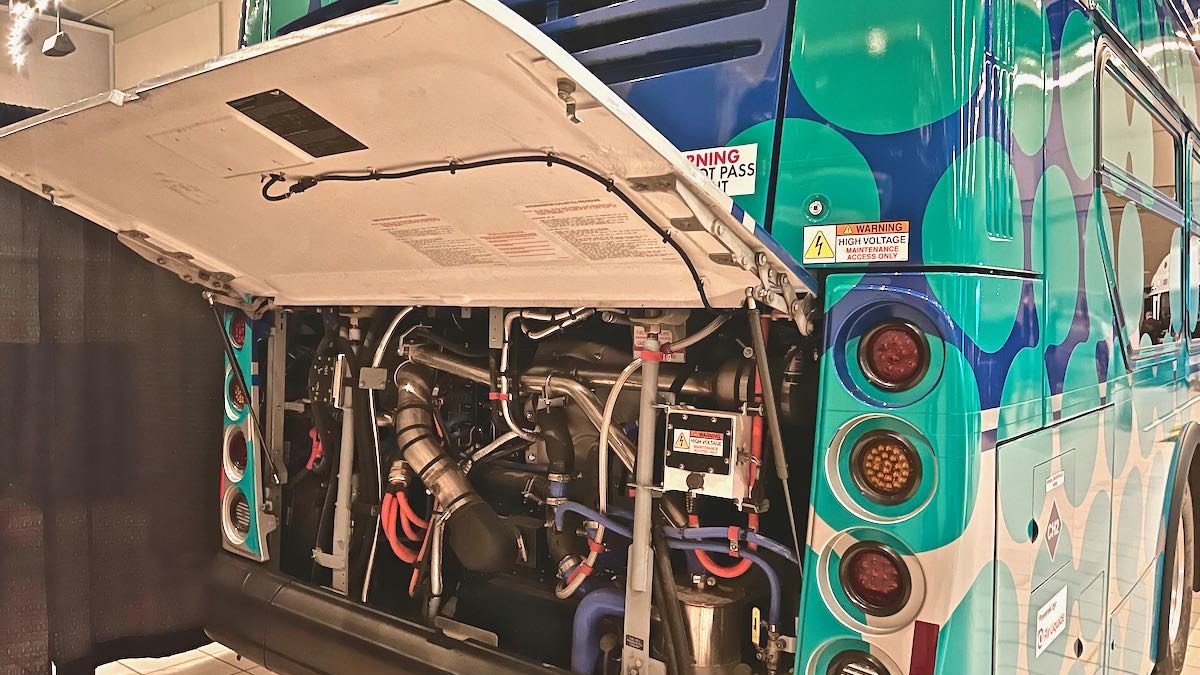If Eddie Robar could steal Mother Nature’s job for a day, we’d all be waking up on Feb. 15 to a bone-chillingly cold morning.
Robar’s ideal scenario would be for temperatures of -25 C.
That’s because two hydrogen-powered buses will be tested on Feb. 15, and Edmonton Transit and Strathcona County officials are looking forward to seeing how the Xcelsior vehicles from New Flyer will perform in wintry conditions. The colder, the better.
Robar is the City’s Branch Manager of Fleet and Facility Services. His job is to ensure Edmonton’s fleet of vehicles, from buses to service trucks to snowplows, is emissions neutral by 2050. And, while the City has already added 60 battery-powered electric buses to its fleet, we are entering a sweet spot for replacement of the fleet. And hydrogen powered buses could provide a more convenient answer than their battery-powered counterparts.
“Just under 50 per cent of that [ETS] fleet is becoming of age in the next four to six years,” Robar said at this week’s Forward Slash Hydrogen Summit, held at the Edmonton Convention Centre. “So we’ve got an awesome opportunity to retrofit and convert the fleet to a more sustainable fuel moving forward.”
But, before any big buy, first, comes the test. It will be done with the assistance of experts from the University of Alberta. New Flyer says its hydrogen-powered buses have a range of 370 miles (that’s about 595 kilometres for us Canadians, because we like to use measurements that make sense). But those mileage numbers are based on tests done in dry, warm California conditions. Hydrogen-vehicle manufacturers are no different than their gasoline-engine counterparts — they do their mileage testing in dry, warm places, where engines perform at their peaks. The mileage numbers never translate to Alberta winters.
The two buses were on display at the conference.
But, if the City has already made significant investments in battery-powered buses, why be so excited about hydrogen?
Robar said the performance of the battery-powered bus declines significantly in cold temperatures. They run great in the summer, but their ranges decrease in the winter. Because it’s a new technology, the City and its suppliers have been working on ways to make the buses more efficient in the winter, including using blankets to keep the batteries warm.
“We’ve learned a lot from the electrification strategy,” he said. “What it takes to electrify fleets, what transition looks like, and how to do it in a sustainable way, and how do you meet your targets in an industry and a world that isn’t as grid friendly. How do we move along that path, and I think there’s a lot to be said about the conversion model in battery electric, which has now led us into the sphere of hydrogen.
There are issues with hydrogen; the fuel supply network is in its nascent stage.
“Everything relies on fuel, here,” said Robar. “And, I think with a hydrogen fueling strategy, for us to be able to convert the fleet, it really depends on how much we can get.”
And, insurers are still wary about the technology.
While this example comes from the trucking industry, it gives you the idea about the insurance barriers that exist with hydrogen.
Trevor Van Egmond, the senior manager of Industry Advancement at Alberta Motor Transport Association, said that it can cost $35,000 a year to insure a hydrogen powered truck, while a diesel-engine vehicle can be about $3,500 a year to insure. So there are barriers to entry for hydrogen at the moment.
But hydrogen zero-emission vehicles are more efficient than their battery-powered cousins — at least in 2023.
Robar explained that it can take more than an hour to fully charge a battery powered bus. It has four batteries, which add a lot of weight to the vehicle. And, the charging stations take up a lot of space in the garage. The city’s five transit garages are pretty well at capacity, so having buses waiting to be charged is not an efficient use of space.
But, refueling a hydrogen bus takes less time than listening to “Stairway to Heaven” from front to back. The question: How much will its performance degrade in the winter?
C’mon Mother Nature. Let’s do a -25 on Feb. 15. We need it.
Savvy AF. Blunt AF. Edmonton AF.




